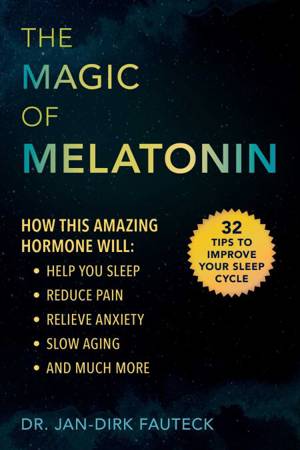
- Retrait gratuit dans votre magasin Club
- 7.000.000 titres dans notre catalogue
- Payer en toute sécurité
- Toujours un magasin près de chez vous
- Retrait gratuit dans votre magasin Club
- 7.000.0000 titres dans notre catalogue
- Payer en toute sécurité
- Toujours un magasin près de chez vous
The Magic of Melatonin EBOOK
How this Amazing Hormone Will Help You Sleep, Reduce Pain, Relieve Anxiety, Slow Aging, and Much More
Jan-Dirk Fauteck
Ebook | Anglais
14,53 €
+ 14 points
Format
Description
Everything you need to know about the sleep-regulating hormone melatonin!
We've always been told maintaining a healthy sleep cycle is of utmost importance to your day-to-day health. But have we ever been told why?
Anyone familiar with chronobiology (the science of natural physiological rhythms) knows that the hormone melatonin is the foundation hormone for the circadian rhythm research. In fact, melatonin and sleep research is one of the most fundamental and best-known rhythms in the human body. Disturbance of the melatonin cycle due to any reason interferes with the sleep/wake cycle, which ultimately leads to a number of other neurobehavioral and psychological problems.
Due to the widespread misuse of light at night, modern societies no longer hold a clear distinction between day and night. This increase in light pollution at night interferes with the ability of the pineal gland to produce and disperse melatonin properly. As a result, either no or a severely dampened melatonin rhythm exists in individuals exposed to artificial light during the normal dark hours, which includes most people living in cities and in all individuals who work at night. This suppression of a distinct melatonin rhythm and all other biological cycles represents a serious perturbation of the biological clock of many organs, contributing to pathophysiology.
Dr. Fauteck also addresses the impact of proper supplemental melatonin and various studies and research done on the topic. Melatonin has been widely used to correct problems of sleep disorders, and while this book looks into that research further and breaks down the impact of melatonin and sleep, it also addresses research that addresses melatonin use for its ability to regulate the circadian clock in general and impact other areas of health such oxidative stress, neuropsychiatric disorders, headaches, chronic pain, digestion, diabetes, fertility, pregnancy, cancer, and many age-related diseases.
In this book, Dr. Fauteck summarizes critical information related to the necessity of maintaining regular biological rhythms and describes the pathological consequences of circadian rhythm disturbances. He provides a clear description of how melatonin is produced and secreted, how the prevailing artificially imposed light/dark cycle can disturb its rhythm, and how this translates into other potential pathologies.
We've always been told maintaining a healthy sleep cycle is of utmost importance to your day-to-day health. But have we ever been told why?
Anyone familiar with chronobiology (the science of natural physiological rhythms) knows that the hormone melatonin is the foundation hormone for the circadian rhythm research. In fact, melatonin and sleep research is one of the most fundamental and best-known rhythms in the human body. Disturbance of the melatonin cycle due to any reason interferes with the sleep/wake cycle, which ultimately leads to a number of other neurobehavioral and psychological problems.
Due to the widespread misuse of light at night, modern societies no longer hold a clear distinction between day and night. This increase in light pollution at night interferes with the ability of the pineal gland to produce and disperse melatonin properly. As a result, either no or a severely dampened melatonin rhythm exists in individuals exposed to artificial light during the normal dark hours, which includes most people living in cities and in all individuals who work at night. This suppression of a distinct melatonin rhythm and all other biological cycles represents a serious perturbation of the biological clock of many organs, contributing to pathophysiology.
Dr. Fauteck also addresses the impact of proper supplemental melatonin and various studies and research done on the topic. Melatonin has been widely used to correct problems of sleep disorders, and while this book looks into that research further and breaks down the impact of melatonin and sleep, it also addresses research that addresses melatonin use for its ability to regulate the circadian clock in general and impact other areas of health such oxidative stress, neuropsychiatric disorders, headaches, chronic pain, digestion, diabetes, fertility, pregnancy, cancer, and many age-related diseases.
In this book, Dr. Fauteck summarizes critical information related to the necessity of maintaining regular biological rhythms and describes the pathological consequences of circadian rhythm disturbances. He provides a clear description of how melatonin is produced and secreted, how the prevailing artificially imposed light/dark cycle can disturb its rhythm, and how this translates into other potential pathologies.
Spécifications
Parties prenantes
- Auteur(s) :
- Editeur:
Contenu
- Nombre de pages :
- 220
- Langue:
- Anglais
Caractéristiques
- EAN:
- 9781510747944
- Date de parution :
- 09-12-19
- Format:
- Ebook
- Protection digitale:
- Adobe DRM
- Format numérique:
- ePub

Les avis
Nous publions uniquement les avis qui respectent les conditions requises. Consultez nos conditions pour les avis.






